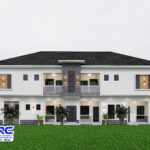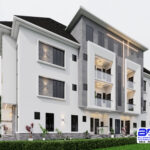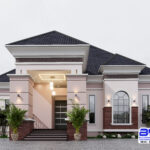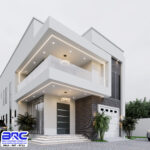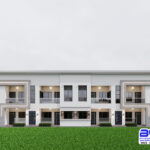Vinyl flooring is a synthetic flooring material made primarily from polyvinyl chloride (PVC).
It is designed to mimic natural materials like wood, stone, or ceramic tiles while being more affordable, water-resistant, and easier to maintain.
Vinyl flooring has gained popularity in Nigeria due to its durability, stylish designs, and cost-effectiveness.
It is commonly used in homes, offices, schools, and commercial spaces.
In this article, Bullionrise consult will help you explore what vinyl flooring is, its advantages and disadvantages, and whether it is the right choice for your space.
Table of Contents
ToggleSee related – 20 main building materials for building and their uses
What is Vinyl Flooring?

Vinyl flooring is a flexible, resilient, and waterproof flooring material available in sheets, tiles, or planks.
It comes in different finishes, including:
1. Vinyl Sheets
Large, continuous rolls of vinyl flooring.
Best for: Large spaces, hospitals, and areas requiring seamless flooring.
2. Vinyl Tiles
Square-shaped vinyl pieces that mimic ceramic or stone tiles.
Best for: Homes and offices.
3. Vinyl Planks (Luxury Vinyl Plank – LVP)
Long, narrow planks that resemble hardwood flooring.
Best for: Luxury apartments, offices, and high-end designs.
See also – Building Materials Used for Building Houses in Nigeria
Advantages of Vinyl Flooring

1. Water-Resistant & Moisture-Proof
- Vinyl flooring is 100% waterproof, making it ideal for kitchens, bathrooms, and humid environments.
- Unlike wood, it won’t warp or swell when exposed to moisture.
2. Affordable & Cost-Effective
- Vinyl flooring is cheaper than tiles, wood, or marble but offers a similar aesthetic appeal.
- Installation is easy, reducing labor costs.
3. Comfortable Underfoot
- Softer than tiles and wood, making it comfortable for walking and standing.
- Provides some cushioning, reducing strain on the feet and joints.
4. Durable & Scratch-Resistant
- Can withstand heavy foot traffic, making it suitable for homes, schools, and offices.
- Scratch-resistant options are available, great for homes with pets or children.
5. Easy to Clean & Maintain
- Requires only regular sweeping and mopping to maintain its appearance.
- Does not require polishing or waxing like wood or marble.
6. Wide Range of Designs & Styles
- Available in designs that mimic wood, stone, or ceramic tiles.
- Comes in various colors and patterns, allowing for customized interior designs.
7. Easy & Quick Installation
- Can be installed over existing flooring without major renovations.
- Some types feature a “click-lock” system for easy DIY installation.
Disadvantages of Vinyl Flooring

1. Not as Durable as Tile or Hardwood
- Although durable, vinyl flooring wears out faster than ceramic tiles or solid wood.
- May need replacement after 10–20 years, depending on quality.
2. Prone to Scratches & Dents
- Heavy furniture can leave dents or marks on vinyl flooring.
- Sharp objects and high heels can cause scratches.
3. Susceptible to Fading
- Prolonged exposure to direct sunlight can cause discoloration.
- Not ideal for outdoor spaces or sunrooms.
4. Difficult to Repair
- Unlike tiles or wood, damaged vinyl flooring cannot be refinished.
- If a section is damaged, you may need to replace the entire flooring.
5. Environmental Concerns
- Made from plastic (PVC), which is non-biodegradable.
- Some low-quality vinyl may emit volatile organic compounds (VOCs), affecting indoor air quality.
See also – 14 Interior Design Ideas for Small Houses in Nigeria
Is Vinyl Flooring Right for You?
Choose Vinyl Flooring If:
- You need a budget-friendly, stylish, and waterproof flooring option.
- You want an easy-to-install and low-maintenance floor.
- You prefer a soft and comfortable surface for walking.
- You want various design options for different rooms.
Avoid Vinyl Flooring If
- You need a highly durable floor that lasts over 20+ years (e.g., ceramic tiles or terrazzo).
- You have heavy furniture that could dent the floor.
- Your space gets a lot of direct sunlight, as vinyl can fade over time.
Conclusion
Vinyl flooring is an affordable, stylish, and water-resistant flooring option perfect for homes, offices, and commercial spaces in Nigeria.
While it offers comfort, durability, and design variety, it is less durable than tiles or hardwood and may require replacement over time.
If you need a budget-friendly and easy-to-maintain flooring solution, vinyl flooring is an excellent choice.
However, for long-term durability, ceramic tiles or terrazzo might be better options.
Frequently asked questions
What is vinyl flooring, and how is it made?
Vinyl flooring is a synthetic flooring material made from polyvinyl chloride (PVC), designed to mimic the appearance of natural materials like wood, stone, or tiles.
It comes in various forms, including sheets, planks, and tiles, offering versatility in design and installation.
Manufacturers produce it by combining PVC with stabilizers and pigments, followed by layering and embossing techniques to create textures and patterns.
Its durable and water-resistant nature makes it suitable for various indoor applications.
What are the main advantages of using vinyl flooring in homes or offices?
Vinyl flooring is affordable, versatile, and available in a wide range of designs and colors to suit any style.
It is water-resistant and easy to clean, making it ideal for wet areas like bathrooms and kitchens.
Additionally, vinyl offers durability and comfort underfoot, especially in high-traffic spaces.
Installation is relatively simple, and maintenance is low compared to other flooring types.
Are there any disadvantages or challenges associated with vinyl flooring?
One challenge is that vinyl flooring can be prone to dents and scratches from heavy furniture or sharp objects.
Over time, its appearance may fade, especially in areas exposed to direct sunlight.
Vinyl is not environmentally friendly, as it is made from synthetic materials and is difficult to recycle.
Furthermore, low-quality vinyl products may emit harmful chemicals like volatile organic compounds (VOCs).
How does vinyl flooring compare to other types of flooring, such as wood or ceramic tiles?
Vinyl flooring is more affordable and water-resistant than wood and ceramic tiles, making it suitable for a wider range of spaces.
However, it lacks the natural elegance and resale value of wood floors or the durability of ceramic tiles.
Vinyl is easier to install and maintain, while wood and tiles often require more care and skill.
For spaces requiring moisture resistance and cost efficiency, vinyl is a practical choice.


